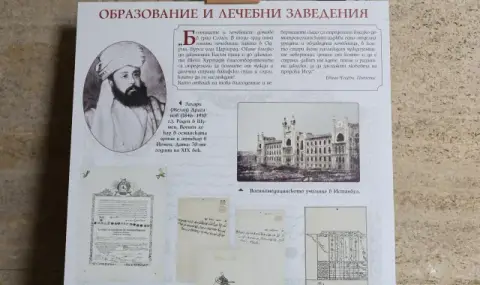"The Ottoman Empire dealt with epidemics, as did modern Bulgarian medicine – using isolation and vaccination. The Sultan, as well as the Bulgarian authorities, paid for the Bulgarian population to be vaccinated.”
This was commented to BGNES by Assoc. Hristiyan Atanasov, chief archivist of the “Oriental Collections” department. to the National Library “St. St. Cyril and Methodius“.
He pointed out that the Bulgarian doctors in the Ottoman army were one of the most active participants in the struggles for church and national independence.
From a modern point of view, it is very difficult to judge the level of medicine in the Ottoman Empire, and for such a long period of time spanning several centuries. In the initial period of her rule in the Balkans, she managed to build hospitals and institutions that took care of the physical and mental condition of the subjects of the empire. This is mostly done through the famous waqf system – a well-known charity system in the Islamic world”, Prof. Atanasov points out.
„The Ottomans created a well-educated class of scientists for their time who were interested in medicine and, accordingly, in the human body, how it should be treated, what diseases it is subject to and how to protect ourselves from them,”, he said he too.
„Over time, however, there is a lag behind the Western European world, including in the field of medicine. Nevertheless, the Ottomans built, if not a modern, then at least a working medical system to some extent,”, the scientist said.
In the 19th century, parallel to the Bulgarian Renaissance, the Ottoman Empire began to modernize on a Western model. This period remains known in history as the Tanzimat. Reforms are taking place primarily in the sphere of state administration and the army, affecting military healthcare very strongly. During this period, a hospital system based on the Western European model began to be created, and the Bulgarians took a very active part in it.
„A medical school was opened in Istanbul,” explains Prof. Atanasov and adds that a number of Bulgarians at that time graduated from it and became doctors in Ottoman hospitals.
„They are part of the Ottoman military administration, as a large number of them were incorporated into the Ottoman army. A very educated elite was formed for its time, which is little known to the general Bulgarian public”, the historian points out.
„This elite played a very important role in the Bulgarian national liberation movement. Most of them are graduates of Ottoman schools, work as doctors in the Ottoman army and become members of the revolutionary committees,“, Prof. Atanasov also says.
„In the Middle Ages, there were also pandemics of very dangerous diseases, such as cholera and plague, for example, which claimed thousands of human lives. They do not pass by the Ottoman Empire. And she fought them in the same way as we dealt with COVID-19 until recently - through isolation and through vaccination," the historian says.
„There is no proven way to combat pandemics from isolation. The Ottomans did the same when they needed to isolate a region or a specific place from the rest of the empire. You can move from one place to another with just a document, as was the case in Bulgaria during COVID-19. This is the only proven working method“, the docent declares.
Also interesting are the initiatives of the High Gate for vaccinations, for example against smallpox.
„And then, as now, all vaccines were met with great distrust. There are also anti-vaxxers in the Ottoman Empire. The authorities paid for Bulgarians to be vaccinated. For example, during one of his visits to Tarnovo, the Sultan paid a few silver coins to each Bulgarian to go and get vaccinated, the historian says.
